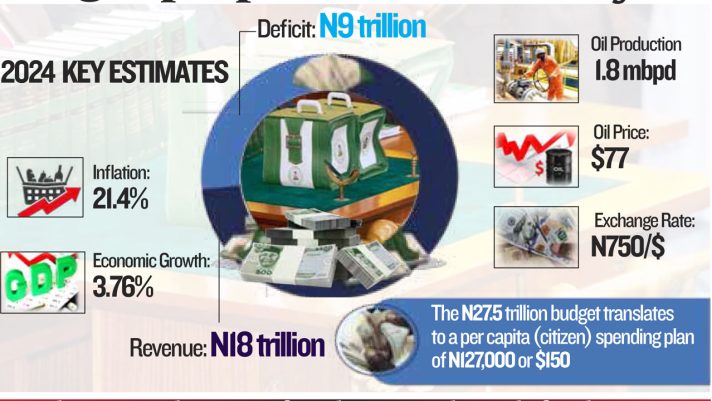-Tinubu to present appropriation bill to NASS tomorrow
-Culture of debt financing, spurious revenue parameters benchmarking continue.
-Govt constrained by exhausted debt allowance
Growth projection inconsistent with Tinubu’s economic ambition.
-Nigeria should be spending 10 times to maximise its potential, says Adi
The Federal Executive Council (FEC), yesterday, approved a total expenditure of N27.5 trillion for next year, endorsing the continuation of spurious appropriation benchmarks and unambitious public spending.
Details of the appropriation may be laid before the National Assembly tomorrow. With the 2024 – 2026 Medium-Term Expenditure Framework and Fiscal Strategy Paper (MTEF/FSP), a three-year rolling plan, already passed by the parliament last week, getting the lawmakers to approve the estimates may be a walk in the park for the executive.
Should there be painstaking scrutiny, the Assembly members will contend with provisions that run at variance with previous promises, positions and official pronouncements of the administration.
For instance, whereas the Finance Minister, Wale Edun, had promised that the administration would not indulge in debt financing but would leverage creative options for public financing, MTEF says the administration intends to borrow over N9 trillion to fund next year’s budget, a tall order considering the current restrictive international debt market, the Central Bank of Nigeria’s (CBN) determination to end reckless and cheap budget supports and the high cost of local borrowing.
The estimated spending for 2024 is also a far cry from the level of expenditure outlay required to grow the economy to President Bola Tinubu’s ambitious $1 trillion. Nigeria’s output hit a peak of $570 billion in 2014 but fell consistently in recent years to $390 billion last year. Tinubu has repeatedly expressed his commitment to grow the economy to a $1 trillion target in the next seven years.
Experts said that would suggest an average double-digit growth. But the MTEF, the template that guides the preparation of next year’s appropriation, caps the growth projection at 4.78 per cent, which is seen as uninspiring and inconsistent with the aspiration of the President.
During his campaign, Tinubu promised an average growth rate of six per cent during his administration. The electoral promise is also far ahead of what the MTEF document prepared by his appointees envisages.
The N27.5 trillion budget translates to a per capita (citizen) spending plan of N127,000, In dollar terms, it comes down to about $150 (using the official exchange rate). The figure is a fraction of South Africa’s $2400 and Egypt’s $1500 per capita budget as of two years ago.
An economist, Prof. Bongo Adi, said it was unfortunate that even Ghana, at over $400, is far ahead of Nigeria in terms of per capita budget. Adi, who is not bothered about the fresh provision for over N9 trillion fresh debt funding next year as contained in the MTEF, said the government should be spending 10 times the proposed N27.5 trillion if it actually wants to grow the economy to $1 trillion mark.
Adi dismissed the proposed expenditure as a joke considering the country’s current size of the economy and where it hopes to be shortly. He observed that the country would need to spend much more on critical infrastructure to return the GDP to the pre-Mohammadu Buhari era.
“If we consider the essential of the GDP we will have a budget 10 times of what we have. Instead of N27.5 trillion, we should be talking about N270 trillion,” he said..
To get the economy back to half a trillion dollars, we need a lot of spending in the right places, in a proper and efficient allocation of resources. In raising the funds, we need the right financing to get the size of the economy we require to take off.” The budget we have now, he said, cannot kick-start the economy.
Noting that borrowing is one of the ways the country could finance its budget, he said: “Even if we are borrowing $500 billion, it is nothing compared to the size of the economy. Debt-to-GDP ratio is nothing; it is a trivial matter. We can build the economy to $10 trillion even before the end of the administration’s first tenure if we invest in the right places.”
The 2024 budget may continue the spurious revenue benchmarks that restrained the performance level of the previous budget to less than 70 per cent in some cases. The controversial oil production benchmark, for instance, remains high at an average target of 1.8 million barrels per day (mbpd) in the next three years, which may not be firmly anchored on market and historical data.
The average production in the past three years was 1.57 mbpd. Sadly, oil majors have continued to divest from the country, while local companies have not demonstrated sufficient capacity to step into their shoes. There is also that a shift in geopolitical tension could increase global supply and reduce Nigerian daily quota currently pegged at 1.8 mbpd even though global demand is projected to hit 106.3 mbpd in 2026.
Conveying FEC’s meeting outcome yesterday at the Presidential Villa, Minister of Budget and Economic Planning, Atiku Bagudu, said the benchmarked oil price was raised from $73 to $77 to meet the revenue of N18 trillion. That may have also exposed the drive, which informed the benchmark number ‘padding’ seen in the MTEF.
The exchange rate was also adjusted upward from N700/$ to N750/$, according to Bugudu, to improve the revenue prospect of the government. Tinubu may present the proposal to a joint session of the National Assembly tomorrow, according to information available at press time.
This information was confirmed to journalists by the Secretary of Research and Information at the National Assembly, Dr Ali Barde Umoru, who was at the Senate on Monday concerning protocol arrangements. It was gathered that the number and category of persons to be given access to the National Assembly Complex will be restricted due to space constraints and security considerations.
The President is said to have written to both the President of the Senate, Godswill Akpabio and the Speaker of the House of Representatives, Tajudeen Abbas, conveying his intention to address the joint session. The two leaders are expected to read the letter to senators and members of the House of Representatives during plenary today.
President Tinubu had forwarded the 2024 – 2026 MTEF/FSP proposing an expenditure of N26.1 trillion for the 2024 fiscal year. After two weeks of deliberations and interface with heads of ministries, departments and agencies (MDAs) on revenue and expenditure projections made for them, N26.1 trillion proposed as the 2024 budget and other parameters were approved last week.
The lawmakers approved the new borrowings of N7.8 trillion while pegging the oil price benchmark for 2024 at $73.96 and oil production at 1.78 million barrels per day. Other parameters approved were GDP growth rate of 3.76 per cent, an inflation rate of 21.4 per cent, an exchange rate of N700/$ and a projected budget deficit of N9.04 trillion.


